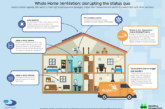Orbit has released its updated Sustainability Strategy in recognition of the cost-of-living crisis, the impact of climate change on customers and recent world events.
Developed with customers, colleagues and other stakeholders, the new Strategy sets out clear objectives and targets for each of its four pillars: Our Customers, Quality Homes and Places, Our Planet, and Our People. These range from delivering social value and positive customer interventions, to achieving net zero carbon, and reducing its gender pay gap.
Group Chief Executive, Phil Andrew, commented: “Our Sustainability Strategy focuses on how we can play our part in the response to climate change and meet people’s needs now and in the future. Understandably this is not a finite task and, since the publishing of our original Sustainability Strategy in 2021, much has changed, not least the extreme pressure placed on our customers by the cost-of-living and energy crises.
“In updating our Sustainability Strategy, we have listened to the issues that matter most to our customers and colleagues, and assessed Orbit’s material impact against those issues, and our ability to affect change. This is the resulting strategy, and the collaboration of our stakeholders has been fundamental in shaping the long-term targets that we have committed to achieving.”
Since its first Sustainability Strategy was released in 2021, Orbit has launched its Orbit to Zero: Net Zero Carbon Roadmap and Biodiversity Approach, the latter of which makes a commitment to the Global Biodiversity Framework’s 30 by 30 target. The not-for-profit has also introduced a new Thriving Communities strategy to deliver social value to its customers, launched its Sustainable Finance Framework and embedded sustainability performance throughout its operations.
The leading affordable housing provider has also achieved ISO14001:2015 certification for its environmental management system by the British Standards Institute (BSI) and introduced a new environmental sustainability qualification for its colleagues, the first in-house training of its kind in the social housing sector, developed by the Institute of Environmental Management and Assessment (IEMA).
Commenting on the Strategy, David Weaver, Chair of Orbit Group added: “Orbit is a socially driven, commercially minded organisation and sustainability is integral to our core vision. It is vital that we adapt and shape our approach to maximise the positive impact we make as an organisation and to meet the changing challenges our customers and communities face.”
Later this year Orbit will publish its third Annual Sustainability Report, reporting on progress against its sustainability strategy objectives and targets.
To download a copy of the Strategy, visit: www.orbitgroup.org.uk/sustainability/










